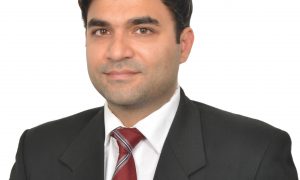This Interview has been published by Pragya Chandni and The SuperLawyer Team

Could you share a bit about your educational journey, particularly how you transitioned from your LL.B. degree to pursuing LL.M. in Intellectual Property Law at The George Washington University Law School?
While completing my BA.LL.B, I enrolled in a diploma course in Intellectual Property Laws at the Indian Institute of Law during my third year of law school. It was during my fourth year, as part of my curriculum, that I delved deeper into Intellectual Property law, sparking a keen interest in the subject. By the time I reached my final year, my aspiration for higher education had crystallized, leading me to forgo immediate employment in favour of pursuing advanced studies. I applied to several esteemed law schools in both the US and UK renowned for their offerings in Intellectual Property Law. Upon receiving admission to George Washington University, widely recognized for its excellence in this field, my decision was made without hesitation.
Your LL.M. focused on Intellectual Property Law, among other areas. What sparked your interest in this field, and how has this specialization influenced your career path?
I became interested in intellectual property law (IP) while studying it during my undergraduate studies. It is fascinating because it mixes law, technology, creativity, and new ideas. During my LL.M., I became even more interested in the subject. In today’s corporate landscape, whether working as a corporate lawyer for a multinational corporation in industries such as oil and gas, IT, pharmaceuticals, or others, it’s imperative to have a keen awareness of the intellectual property (IP) owned by your company. Understanding how to safeguard these assets from infringement is paramount. My master’s degree in Intellectual Property Law has played a pivotal role in meeting this requirement. I’ve found that understanding and safeguarding intellectual property is crucial for the success of any company. It’s been instrumental in my ability to comprehend and effectively protect the intellectual property assets of the organization I work for.
You’ve had significant experience in both law firms and corporate legal departments. How did these varied experiences shape your understanding of legal practice, especially in the context of intellectual property law and corporate governance?
Upon completing my master’s degree, I sought advice from industry peers and well-wishers who advised me against exclusively focusing on IP at the outset of my career. As a result, I began my career in litigation. After gaining experience in litigation for several years, I transitioned into a role as a corporate lawyer within a software company. It was within this company that I once again engaged with IP matters. Particularly during negotiations for licensing agreements, my prior experience with IP proved invaluable.
Can you elaborate on your role as a Principal Attorney at McDermott, specifically in the domain of sustainability and governance? How do you integrate legal expertise with sustainable practices within a corporate environment?
As Principal Attorney at McDermott, my responsibility is to assist our supply chain team in their endeavours to procure materials and services essential for project execution. In addition to contract negotiation, my team and I provide legal training to enhance their understanding of relevant clauses, thereby empowering them during negotiations. Ensuring adherence to the code of business conduct is paramount in all our activities, particularly concerning sustainability and governance initiatives.
You’ve worked extensively in drafting and negotiating various contracts, including those related to engineering procurement. How do you navigate the complexities of legal frameworks across different jurisdictions, given your experience in regions like the Middle East, India, Europe, and Africa?
In our contractual agreements, we opt for common law as our governing jurisdiction. This choice is deliberate, as contracts governed by common law principles share remarkable similarities across various jurisdictions worldwide. This uniformity simplifies our navigation of legal frameworks and enhances our ability to manage contractual obligations effectively across different regions and jurisdictions.
As someone deeply involved in legal compliance and risk management, how do you stay updated with evolving regulations, especially in areas like intellectual property and corporate mergers?
As someone deeply involved in legal compliance and risk management, staying updated with evolving regulations, especially in areas like intellectual property and corporate mergers, is crucial. I employ various strategies to ensure I’m informed about the latest developments. This includes continuous learning through workshops and seminars, staying updated with legal publications and journals, active participation in professional networks, regular engagement with legal counsel, and monitoring government and regulatory websites for official updates. These efforts enable me to proactively manage legal compliance and mitigate associated risks for our organization.
Transitioning from law school to your current role, what were some of the challenges you faced, and how did you overcome them? Are there any lessons you learned along the way that you would like to share with aspiring legal professionals?
It has been over a decade since I graduated from law school, and I must say, it has been a journey of continuous learning for me. Transitioning from litigation to corporate law posed its challenges. Initially, my experience in litigation wasn’t fully recognized, and I found myself starting from scratch in the corporate world. However, as time progressed, my background in litigation has proven to be advantageous. Today, it gives me a unique edge over other corporate lawyers.
To all aspiring legal professionals, I offer this advice: remain open to learning every day. Be like an empty vessel, ready to absorb new knowledge and experiences. This mindset is essential for growth and success in the legal field.
Finally, considering your journey and expertise, what advice would you give to fresh law graduates aspiring to build a successful career in intellectual property law or corporate governance?
For fresh law graduates aspiring to excel in intellectual property law or corporate governance, specializing and staying informed are paramount. Choose a specific area within these fields and immerse yourself in its intricacies, constantly updating your knowledge with the latest developments and regulations. Practical experience is equally crucial; seek internships or entry-level positions to gain hands-on exposure and insight into real-world applications. Additionally, effective networking is key to building a successful career. Engage with professionals in the industry through events and associations, fostering relationships that can provide valuable guidance and opportunities for growth. By combining specialization, practical experience, and effective networking, aspiring legal professionals can lay a strong foundation for a rewarding career in intellectual property law or corporate governance.
Get in touch with Rajarshi Bhuyan-

























